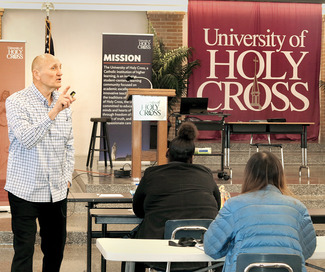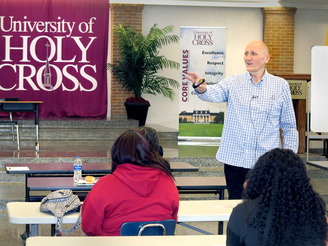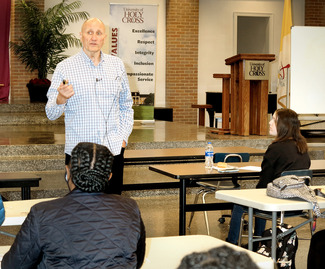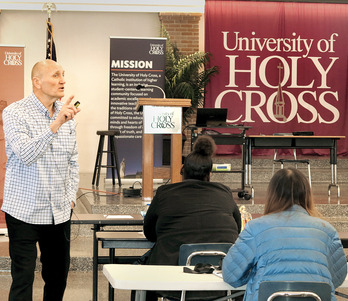
A platform that encourages healthy conversation, spiritual support, growth and fellowship

NOLACatholic Parenting Podcast
A natural progression of our weekly column in the Clarion Herald and blog

The best in Catholic news and inspiration - wherever you are!
First-generation students at UHC create a game plan
-

By Christine Bordelon
Clarion Herald
Imagine being the first generation in your family to attend a college. To whom does this student turn for questions on what to expect, time management or how to study?Realizing that its enrollment demographic follows the national trend in which 56% of students have parents without a bachelor’s degree, the University of Holy Cross (UHC) devised a support system called the Heart and Mind community. Students are provided mentors, counselors, tutors and monthly cohort sessions with other first-generation peers, making the path to graduation more certain by helping students navigate that critical first college year.
 “For any university or college campus, it is important, because first-generation students across the U.S. are the most at risk for not making it through,” said Dr. Stanton McNeely III, UHC president. “That’s a loss for the students, their families, their community and society.”
“For any university or college campus, it is important, because first-generation students across the U.S. are the most at risk for not making it through,” said Dr. Stanton McNeely III, UHC president. “That’s a loss for the students, their families, their community and society.”Mutually beneficial
A pilot program for first-generation students at UHC began in 2018, but the 2021-22 academic year marks the first time every first-generation student has been invited to participate, said Todd Amick, Ph.D., JD, the Sue Ellen Canizaro chair of Catholic theology, faculty assembly president and UHC’s Heart and Mind Community Coordinator.Grants from the Daughters of Charity, MMI and the Raskob Foundation for Catholic Activities have funded the program. Initially, there were 10 mentees and 10 mentors. This year, 14 freshmen and nine mentors (five were former mentees) are participating, Amick said.
Karla Mendez, 23, a native of Puerto Rico and an inaugural mentee, is now a senior studying biology with aspirations to be a physician assistant. She said the program has been invaluable.
“When I first got in the program, it spoke to all the feelings I was having,” she said. ”My mom and dad didn’t speak English at home, so I didn’t have parents to help me with school work or the planning of my classes in college.“I quickly realized I was focused, but not on the things that were most important. The planning system helped me push myself and understand the importance of being organized in my goals that I wanted to achieve. Having a mentor and required counseling, I was able to speak to someone about my feelings. It really helped me become a better version of myself.”
Mendez said her mentor, who earned a Ph.D., was like a big sister, taking her to cafes to study. Mendez followed her example and became a mentor.
“I can pass it forward,” she said. “I was a mess and now I have gathered myself enough to help someone else – who might feel like a mess – to become a better version of themselves. I think every school should have this, starting at high school and into university.”
 Help from an expert
Help from an expert
UHC partnered with Franklin Covey to teach students how to set goals, prioritize activities and stay on track using the planner’s time-management tools.On Nov. 19, Gary Richins, a senior consultant with the Franklin (Covey) Planner Co., spoke to first-generation students.
“There are events we can control but believe we cannot, and there are events we cannot control, but believe we can,” Richins said. “The secret is knowing the difference.”
He showed Franklin Planner’s “Control Continuum’’ graphic that demonstrates reactions to situations where a person has no control and being proactive in situations where a person does have control.
“Being proactive is making things happen,” he said. “Being reactive is letting things happen.”
He emphasized how planning is the key to control because it pre-determines the course of events students take and helps anticipate obstacles and how to adjust. Guidelines for effective planning include reviewing values and goals, setting specific tasks, making a realistic list by evaluating the time each task might take, giving the list order, anticipating obstacles and prioritizing tasks.
“Vital items are those that must be done in a day considering what you would lose if you didn’t do them,” he said.
 Richins, who gives similar talks to Fortune 500 executives, asked UHC students to make one commitment, such as “I will spend 10-15 minutes planning every day.”
Richins, who gives similar talks to Fortune 500 executives, asked UHC students to make one commitment, such as “I will spend 10-15 minutes planning every day.”“You will notice a drastic return on your investment” of time by doing this, he said.
Using the planner’s tools long ago, Richins began asking himself a simple question: “How much control do I have in this situation?” It helped him considerably reach a goal achievable by everyone – inner peace.
“Having serenity, balance and harmony in our lives was achieved through the appropriate control of events,” he said. “I wish I would have done this when I was a student. It gives me tools to focus. … I’ve watched people’s lives change in so many ways.”
Benefits abound
Amick said the program’s name is derived from Congregation of Holy Cross founder Blessed Basil Moreau who said: “We shall always place education side by side with instruction; the mind will not be cultivated at the expense of the heart. While we prepare useful citizens for society, we shall likewise do our utmost to prepare citizens for heaven.”“As a Catholic university, how does our Catholic identity make us particularly able to welcome and support our first-generation community?” Amick said. “Our response is based on the virtues of hope and love, especially in accompaniment.”
“We have a mission to be a prophetic presence, give them that hand of love, that hand of Christ to let them know we’re here for you,” McNeely said. “We want to make sure we give them all the right elements to help them succeed not only in their classes but in personal and spiritual growth as well. And, it impacts beyond graduation – to be a better person in an ever-changing world.”
To qualify for the program, first-generation students must have a 2.5 grade-point average from high school or college. Modest stipends are given to participants. The University of Holy Cross is located at 4123 Woodland Drive in Algiers. Call (504) 398-2170, email: [email protected] or visit bit.ly/3lA3k5z.




